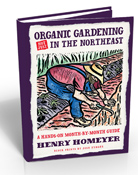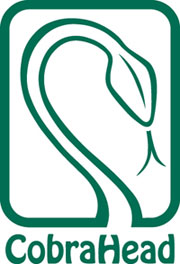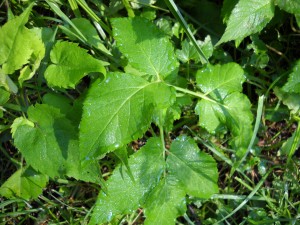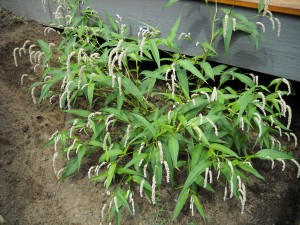Uninvited Visitors: the Good, The Bad, and the Ugly
Years ago my sister had a friend in New York who would arrive at my house once or twice a year, unannounced – and always at dinner time. He always stayed until we invited him for dinner but never brought anything to contribute. He had good stories to tell of his times in Africa, so we fed him and excused his unannounced arrivals and large appetite. I‘ve had other visitors who also arrived without an invitation, some of whom wanted to stay for days and who left wet towels on the bathroom floor. There are similarities in the plant world, too: some plants arrive unannounced and shouldn’t be allowed to stay, while others welcomed.
Decades ago a handsome flower arrived in my garden on its own. It was a bellflower, one called, in scientific parlance, Campanula glomerata. This is a nice cut flower with a bright bluish-purple blossom. Never having seen one, I thought I had discovered a new plant, or perhaps a fabulous wildflower had arrived in my garden. I soon learned its name, and that it spread by root, but flopped over, and was, though nice, not as nice as I had first thought. Where did it come from? Who knows? Seeds, I suppose, perhaps in a pot containing other flowers, or carried by a bird.
Not all uninvited visitors are nice. Goutweed (Aegopodium podagraria) and bishop’s weed (the variegated form of goutweed), is the bane of many a gardener’s existence. This invasive was introduced from Japan as a groundcover that could grow in sun or shade, wet or dry. The all-green form, goutweed, will take over a flowerbed in no time, smothering less persistent plants. It is nearly impossible to weed out, as even a small section of root will produce a plant – and more roots. For the organic gardener, the only way to control it is to smother it with plastic and a thick layer of bark mulch. I got some many years ago with a gift of iris – their roots were intertwined. Bishops weed, with its green and white leaves, is less invasive, but sometimes it reverts to the all green form and takes over. So beware!
Great blue lobelia (Lobelia siphilitica) is a fine, upstanding blue-flowered plant that comes and goes in my garden as it pleases. I let it pick its own location, seldom weeding it out, as I know it will never be a problem. It forms small clumps of a dozen plants or less, each spike standing 18-24 inches tall. I’ve known it to travel over 100 yards from one year to the next, and I don’t recall that I ever purchased a plant.
Last winter was virtually snowless, so roots of plants got colder than normal (snow is an excellent insulator). I lost most of my hollyhocks, but I assume that seeds are in the ground and that they will return. Many books list hollyhocks as biennials, but I have had some plants that persisted, growing from the same roots for several years – especially if I cut down the stems right after flowering. Hollyhocks have moved around my gardens at will, seeds traveling downhill on rainy days, as near as I could tell. I had to transplant some as they became very well established in my vegetable garden.
I recently installed a small garden for a client in Wilder, Vermont, who would not let me remove some of her weeds! She had one that stood nearly 3 feet tall and was covered with small white flowers. It looked to be related to flowers in the genus Persicaria. The weed, deemed a wildflower, is on a Brandeis University web site, http://www.bio.brandeis.edu/fieldbio/leeci_unet/. It’s called lady’s thumb, with the scientific name Polygonum persicaria. That name indicates that the plant looks like a Persicaria, but is in the buckwheat family. So it continues to thrive in her garden – as a wildflower. And now that I know it is a wildflower, not a weed, I like it better. Isn’t that silly? I guess I fear that weeds will take over a space, but know that most wildflowers will not.
That same client also requested that I leave a creeping weed called purslane (Portulaca oleracea). It has glossy, fat leaves and can lay flat against the soil, or stand up as tall as 6 inches. Hers was a low-growing type, and makes a good groundcover – and a nice meal. Yes, I’ve eaten it by sautéing it in olive oil with a little garlic. If you wish to try some, please be sure to get positive identification of it from a knowledgeable person. Most plants are not poisonous, but I’d hate for you to get sick from trying something you should not eat.
Another client told me that she weeded out rose campion (Lychnis coronaria or Silene coronaria) because it jumped up all over the garden. I love it, and let it choose to grow wherever it chooses. It is a biennial with slightly fuzzy gray leaves that has a 4-petaled magenta flower in its second year. But if you want your garden to be ordered and organized in a specific way, perhaps it is not for you.
We all have different tolerances for uninvited visitors, both flowers and people. I think the important thing for me is to know that, if I choose, I can get rid of them without too much trouble.
Henry’s new children’s book, a fantasy-adventure about a boy and a cougar, will be out soon: Wobar and the Quest for the Magic Calumet from Bunker Hill Publishing. His Web site is www.Gardening-Guy.com.




